The demand for savory yogurt in Japan is projected to grow from USD 62.4 million in 2025 to USD 87.5 million by 2035, reflecting a CAGR of 3.5%. Savory yogurt, which combines the creamy texture of traditional yogurt with savory ingredients like herbs, spices, and vegetables, is gaining popularity among health-conscious consumers looking for nutritious and unique food experiences. This shift from sweet to savory flavors in the yogurt market is driven by growing consumer interest in functional foods and innovative flavors. Additionally, as the demand for probiotic foods continues to rise, savory yogurt offers a convenient way for consumers to enjoy gut health benefits along with the satisfaction of a savory snack.
The trend towards new culinary experiences and exploration of different taste profiles in the Japanese market further supports the growth of savory yogurt. As international food influences continue to shape local eating habits, the market for savory yogurt will continue to expand, especially in premium and innovative product offerings. Moreover, the increasing availability of savory yogurt varieties in supermarkets, convenience stores, and online platforms will make this category more accessible to a broader consumer base.
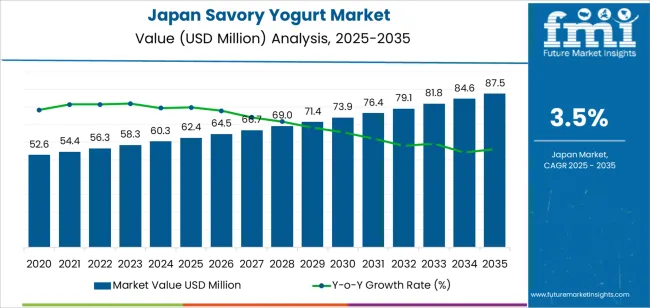
From 2025 to 2030, the demand for savory yogurt in Japan will grow from USD 62.4 million to USD 73.9 million, contributing an absolute increase of USD 11.5 million in value. During this period, the growth will be driven by the increasing interest in functional foods and the expanding adoption of innovative dairy products. The rise in health-focused eating and the shift towards savory flavors in yogurt will fuel this growth. Increased availability of savory yogurt in retail outlets and consumer awareness about the digestive benefits of yogurt, coupled with the popularity of low-fat and probiotic foods, will support the market’s expansion. During this phase, the absolute growth will be moderate, with steady increases in both market penetration and consumer adoption.
From 2030 to 2035, the demand for savory yogurt will grow from USD 73.9 million to USD 87.5 million, adding USD 13.6 million in value. This phase will see continued growth, but at a slower pace compared to the first half of the forecast period, as the market approaches maturity. The growth will still be significant, driven by continued product innovation, such as the introduction of new savory flavors, ingredients, and packaging formats. However, as consumer adoption stabilizes, the absolute growth will shift from rapid adoption to steady expansion, focusing on retaining a loyal customer base and offering more premium, differentiated products.
| Metric | Value |
|---|---|
| Industry Sales Value (2025) | USD 62.4 million |
| Industry Forecast Value (2035) | USD 87.5 million |
| Industry Forecast CAGR (2025 to 2035) | 3.5% |
Demand for savory yogurt in Japan is increasing as consumer interest shifts toward novel flavour profiles and functional snack formats beyond traditional sweet yogurts. The broader yogurt market in Japan is expanding at a compound annual growth rate (CAGR) of around 7 % to 9 % and manufacturers are introducing innovative savoury-style yogurt products to capture this trend. These products cater to emerging preferences for healthier, less sugary snacks and align with the demand for convenient, ready-to-eat dairy formats.
Another driver is the rise of on-the-go eating and integration of yogurt into broader meal occasions or cooking applications. Savoury yogurt variants, such as those with herbs, vegetables, or spice infusions, offer breakfast, snack, or meal‐component versatility that fits Japanese urban lifestyles. Brands seeking differentiation and premium positioning are leveraging these formats. Challenges include consumer taste adaptation toward savoury yoghurt and the need for clear positioning that distinguishes them from traditional dairy snacks. Despite these obstacles, the intersection of health consciousness, flavour innovation and convenience suggests that demand for savory yogurt in Japan will continue to grow.
The demand for savory yogurt in Japan is primarily driven by product type and sales channel. The leading product type is drinks, capturing 40% of the market share, while supermarkets are the dominant sales channel, accounting for 60% of the demand. Savory yogurt, which includes flavors like herbs, spices, and vegetables, has gained popularity as a unique and healthy alternative to sweetened dairy products. The trend toward healthier, more functional foods is driving growth in this market, particularly in more accessible retail environments like supermarkets.
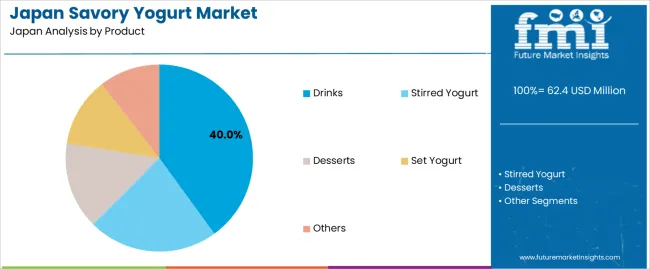
Drinks are the leading product type for savory yogurt in Japan, accounting for 40% of the demand. Savory yogurt drinks, often infused with ingredients like herbs, garlic, or cucumber, are gaining popularity due to their refreshing taste, health benefits, and portability. These yogurt drinks are typically marketed as probiotic-rich beverages that promote digestive health and offer a convenient snack or meal replacement.
The growing interest in functional foods, along with the shift toward more savory and less sugary snacks, has fueled the rise of savory yogurt drinks. They cater to the demand for probiotic and gut-health-focused products, and are especially appealing to health-conscious consumers. As the popularity of savory and fermented foods continues to grow in Japan, savory yogurt drinks are expected to remain a key driver in the market, providing an innovative twist on traditional yogurt offerings.
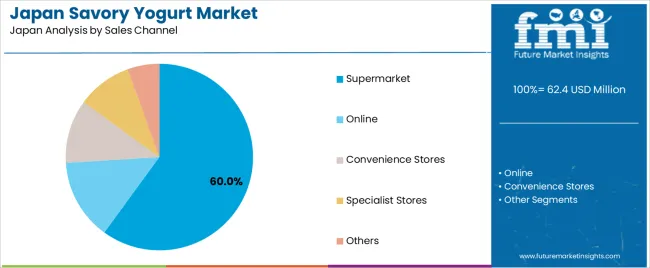
Supermarkets are the leading sales channel for savory yogurt in Japan, capturing 60% of the demand. Supermarkets are a convenient and accessible platform for consumers to find a wide range of savory yogurt products, from drinks to stirred and set varieties. Supermarkets provide the opportunity for savory yogurt products to be displayed alongside other dairy items, offering consumers a chance to explore new and innovative flavors in a familiar setting.
The dominance of supermarkets is driven by their ability to offer a broad selection of dairy products and the growing interest in health-conscious eating habits. With the increasing demand for savory and functional food products, supermarkets are adapting to meet consumer preferences by expanding their range of savory yogurt options. As more consumers seek convenient, healthy, and savory snack options, supermarkets will continue to be a central channel for the distribution of savory yogurt in Japan.
Demand for savory yogurt in Japan is emerging as consumers seek alternative snack formats that blend health functionality with novel flavor profiles. The broader yogurt segment is expanding, supported by wellness trends and convenience eating. Innovation in savory variants, such as herb-infused, vegetable-based or low-sugar yogurt dips, aligns with this shift. At the same time, cultural taste preferences, awareness of the format and the need to reformulate traditional sweet yogurt into savory styles moderate the pace of acceptance in Japan.
Growth is supported by several factors. First, increasing health and wellness awareness drives interest in yogurt products offering protein, probiotics and functional benefits beyond sweet treats. Second, busy urban lifestyles and increased snacking occasions encourage single serve yogurt formats and portable savory snacks. Third, manufacturers and foodservice operators are innovating with savory yogurts, such as yogurt dips, spreadable formats or meal companion yogurts, that open new usage occasions. Fourth, the expansion of online retail and convenience stores in Japan enhances accessibility of novel yogurt varieties, helping savory styles gain traction.
Despite opportunity, restraints remain. One limitation is consumer familiarity. Savory yogurt is still a niche concept in Japan, and many consumers associate yogurt with sweet flavors, which may limit trial and repeat purchase. Cost of product development and sourcing ingredients for savory formats, such as herbs, vegetables and low sugar profiles, may raise price points and constrain adoption among value sensitive shoppers. Taste profile acceptance is critical in Japan, where subtle and balanced flavors are preferred, so less successful flavor launches may hamper category growth. Finally, regulatory and labeling standards for functional claims and novel snack formats may slow innovation.
Notable trends include the introduction of savory yogurt products tailored to Japanese taste preferences, such as miso, seaweed, wasabi or sesame flavors, to bridge novelty and local familiarity. Suppliers are increasingly positioning yogurt as part of meal occasions, such as a side dish, snack or dip, rather than just sweet dessert, opening new channels in ready meals and convenience food. Clean label and low added sugar formulations are also gaining importance as competitive differentiators in yogurt innovation. Additionally, collaborations between dairy brands and food service/catering channels are introducing savory yogurt formats in cafes, bento boxes and snack packs, increasing exposure and consumer acceptance.
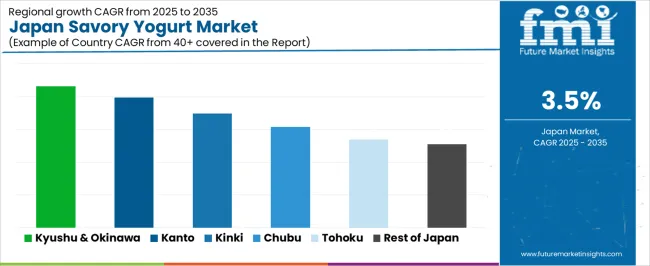
The demand for savory yogurt in Japan is driven by the country’s evolving consumer preferences for unique and innovative food products. Traditionally, yogurt in Japan has been consumed in sweet forms, but savory yogurt is gaining traction due to the increasing interest in health-oriented, probiotic-rich foods that also provide an unconventional flavor experience. Savory yogurt, often seasoned with ingredients like herbs, spices, or vegetables, is seen as a functional food offering health benefits such as improved digestion and gut health, along with its distinctive, savory taste.
The growing trend of functional foods, combined with Japan’s emphasis on probiotics and gut health, has paved the way for savory yogurt to carve out a niche in the market. Regional demand variations are influenced by factors such as local tastes, the availability of savory yogurt products, and the consumer openness to trying new food innovations. Below is an analysis of the demand for savory yogurt across different regions in Japan.
| Region | CAGR (2025-2035) |
|---|---|
| Kyushu & Okinawa | 4.3% |
| Kanto | 4% |
| Kinki | 3.5% |
| Chubu | 3.1% |
| Tohoku | 2.7% |
| Rest of Japan | 2.6% |
Kyushu & Okinawa leads the demand for savory yogurt in Japan with a CAGR of 4.3%. The region’s growing interest in health-conscious eating, particularly in Okinawa, which is known for its long-lived population and healthy diet, has contributed to the rising popularity of functional and probiotic-rich foods like savory yogurt. Okinawa’s culture emphasizes natural ingredients and balanced diets, making it more open to innovative food products that combine health benefits with unique flavors.
The region’s strong agricultural presence, particularly in areas that produce fresh herbs and vegetables, also supports the development of savory yogurt products. As consumers in Kyushu & Okinawa seek new ways to incorporate health-promoting foods into their diets, the demand for savory yogurt is expected to continue growing at a strong pace.
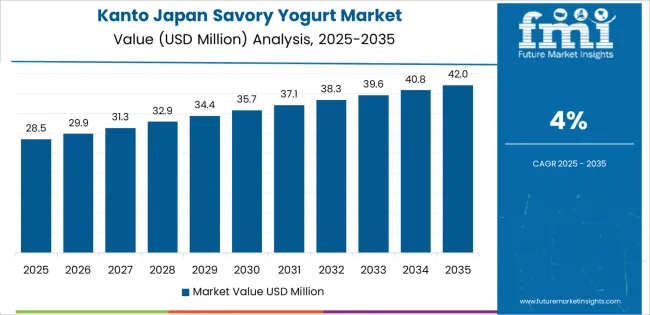
Kanto shows strong demand for savory yogurt with a CAGR of 4.0%. As Japan’s economic and cultural center, Kanto, which includes Tokyo and surrounding areas, has a large, diverse population that is increasingly health-conscious and open to trying new food trends. The region’s vibrant food culture, with its growing focus on functional foods and probiotics, makes Kanto a key driver for the demand for savory yogurt.
The region’s retail infrastructure, including supermarkets, health food stores, and online retailers, ensures the widespread availability of new food products like savory yogurt. As more consumers in Kanto embrace health-focused diets, the demand for savory yogurt, particularly as a functional food with gut health benefits, is expected to continue growing at a significant rate.
Kinki, with a CAGR of 3.5%, shows steady demand for savory yogurt. The region, which includes cities like Osaka, Kyoto, and Kobe, is known for its rich culinary culture and a growing interest in innovative food products. Although Kinki's demand for savory yogurt is slightly lower than that of Kyushu & Okinawa and Kanto, the steady growth can be attributed to the increasing popularity of functional foods and the expanding consumer base that is interested in probiotic-rich options.
The growing availability of savory yogurt in local supermarkets, health food stores, and restaurants in Kinki is supporting steady demand. As consumers in Kinki become more aware of the health benefits of probiotics and functional foods, the market for savory yogurt is expected to continue to grow gradually.
Chubu demonstrates moderate growth in the demand for savory yogurt with a CAGR of 3.1%. While the region, which includes Nagoya and surrounding areas, has a strong industrial and manufacturing base, its food culture is also increasingly embracing health-conscious eating. The demand for savory yogurt in Chubu is driven by the rising interest in probiotics and functional foods, with consumers seeking new ways to improve digestive health.
Although the growth rate in Chubu is slower compared to regions like Kyushu & Okinawa and Kanto, the demand is supported by the expanding retail offerings and growing awareness of functional foods. As Chubu's population becomes more health-conscious, the demand for savory yogurt is expected to grow steadily, albeit at a more moderate pace.
Tohoku, with a CAGR of 2.7%, and the Rest of Japan, with a CAGR of 2.6%, show slower growth in the demand for savory yogurt compared to more urbanized regions. These areas have a more traditional food culture, and the adoption of newer, unconventional food trends like savory yogurt is slower. However, the increasing awareness of the health benefits of probiotics and functional foods is gradually driving demand in these regions.
While the growth is slower, the introduction of savory yogurt products in local supermarkets and health food stores, along with rising consumer interest in gut health, will likely lead to gradual adoption. As consumers in Tohoku and the Rest of Japan continue to embrace healthier food options, the demand for savory yogurt is expected to see incremental growth in the coming years.
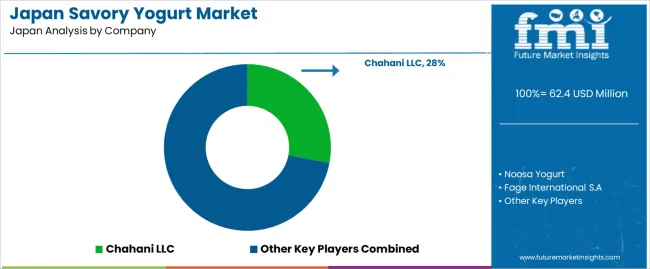
The demand for savory yogurt in Japan is growing as consumers look for innovative, healthy, and diverse food options that offer both nutritional benefits and unique flavors. Companies like Chahani LLC (holding approximately 28% market share), Noosa Yogurt, Fage International S.A., General Mills Inc., and Blue Hill Inc. are key players in this emerging market. Savory yogurt, often infused with herbs, spices, and vegetables, is gaining popularity as a versatile product for both snacking and as a condiment, appealing to health-conscious consumers and those seeking more sophisticated flavors beyond traditional sweet yogurt.
Competition in the savory yogurt industry is primarily driven by flavor innovation, product quality, and health benefits. Companies are developing new savory yogurt varieties that incorporate ingredients like garlic, cucumber, and other vegetables, targeting consumers interested in functional foods or those seeking alternatives to traditional dairy products. Another area of competition is the growing trend of using probiotics and other beneficial ingredients, such as prebiotics and plant-based options, to enhance the nutritional profile of the product.
Additionally, there is a focus on creating products that are aligned with Japan’s clean-label and sustainability trends, with many companies offering options made from organic ingredients or focusing on eco-friendly packaging. Marketing materials often emphasize health benefits such as gut health, digestion, and immune support, along with the unique taste experience of savory yogurt. By aligning their offerings with the growing interest in functional, innovative, and flavorful food options, these companies aim to strengthen their position in the Japanese savory yogurt market.
| Items | Details |
|---|---|
| Quantitative Units | USD Million |
| Regions Covered | Japan |
| Product | Drinks, Stirred Yogurt, Desserts, Set Yogurt, Others |
| Sales Channel | Supermarket, Online, Convenience Stores, Specialist Stores, Others |
| Key Companies Profiled | Chahani LLC, Noosa Yogurt, Fage International S.A, General Mills Inc., Blue Hill Inc. |
| Additional Attributes | The market analysis includes dollar sales by product type and sales channel categories. It also covers regional demand trends in Japan, driven by the increasing popularity of savory yogurt across different consumer segments. The competitive landscape highlights key manufacturers focusing on innovations in savory yogurt varieties, including both traditional and non-traditional flavours. Trends in the growing demand for convenient and health-focused yogurt products, particularly in supermarkets and online retail channels, are explored, along with advancements in product formulations and packaging. |
The demand for savory yogurt in Japan is estimated to be valued at USD 62.4 million in 2025.
The market size for the savory yogurt in Japan is projected to reach USD 87.5 million by 2035.
The demand for savory yogurt in Japan is expected to grow at a 3.5% CAGR between 2025 and 2035.
The key product types in savory yogurt in Japan are drinks, stirred yogurt, desserts, set yogurt and others.
In terms of sales channel, supermarket segment is expected to command 60.0% share in the savory yogurt in Japan in 2025.






Our Research Products

The "Full Research Suite" delivers actionable market intel, deep dives on markets or technologies, so clients act faster, cut risk, and unlock growth.

The Leaderboard benchmarks and ranks top vendors, classifying them as Established Leaders, Leading Challengers, or Disruptors & Challengers.

Locates where complements amplify value and substitutes erode it, forecasting net impact by horizon

We deliver granular, decision-grade intel: market sizing, 5-year forecasts, pricing, adoption, usage, revenue, and operational KPIs—plus competitor tracking, regulation, and value chains—across 60 countries broadly.

Spot the shifts before they hit your P&L. We track inflection points, adoption curves, pricing moves, and ecosystem plays to show where demand is heading, why it is changing, and what to do next across high-growth markets and disruptive tech

Real-time reads of user behavior. We track shifting priorities, perceptions of today’s and next-gen services, and provider experience, then pace how fast tech moves from trial to adoption, blending buyer, consumer, and channel inputs with social signals (#WhySwitch, #UX).

Partner with our analyst team to build a custom report designed around your business priorities. From analysing market trends to assessing competitors or crafting bespoke datasets, we tailor insights to your needs.
Supplier Intelligence
Discovery & Profiling
Capacity & Footprint
Performance & Risk
Compliance & Governance
Commercial Readiness
Who Supplies Whom
Scorecards & Shortlists
Playbooks & Docs
Category Intelligence
Definition & Scope
Demand & Use Cases
Cost Drivers
Market Structure
Supply Chain Map
Trade & Policy
Operating Norms
Deliverables
Buyer Intelligence
Account Basics
Spend & Scope
Procurement Model
Vendor Requirements
Terms & Policies
Entry Strategy
Pain Points & Triggers
Outputs
Pricing Analysis
Benchmarks
Trends
Should-Cost
Indexation
Landed Cost
Commercial Terms
Deliverables
Brand Analysis
Positioning & Value Prop
Share & Presence
Customer Evidence
Go-to-Market
Digital & Reputation
Compliance & Trust
KPIs & Gaps
Outputs
Full Research Suite comprises of:
Market outlook & trends analysis
Interviews & case studies
Strategic recommendations
Vendor profiles & capabilities analysis
5-year forecasts
8 regions and 60+ country-level data splits
Market segment data splits
12 months of continuous data updates
DELIVERED AS:
PDF EXCEL ONLINE
Demand Signal Repository Solutions Market Size and Share Forecast Outlook 2025 to 2035
Demand Side Management Market Size and Share Forecast Outlook 2025 to 2035
Demand Response Market Analysis - Size, Share, and Forecast Outlook 2025 to 2035
North America Shipping Supplies Market Trends – Innovations & Growth 2024-2034
Demand of Kozani Saffron in Greece Analysis - Size, Share & Forecast 2025 to 2035
Demand of No-acid Whey Strained Dairy Processing Concepts in European Union Size and Share Forecast Outlook 2025 to 2035
Demand for Bronte Pistachio in Italy Analysis - Size, Share & Forecast 2025 to 2035
Demand and Trend Analysis of Gaming Monitor in Western Europe Size and Share Forecast Outlook 2025 to 2035
Demand and Trend Analysis of Gaming Monitor in Korea Size and Share Forecast Outlook 2025 to 2035
Demand and Trend Analysis of Gaming Monitor in Japan Size and Share Forecast Outlook 2025 to 2035
Glycine Soja (Soybean) Seed Extract Market Size and Share Forecast Outlook 2025 to 2035
Demand and Trend Analysis of Yeast in Japan - Size, Share, and Forecast Outlook 2025 to 2035
Demand of Pistachio-based desserts & ingredients in France Analysis - Size, Share & Forecast 2025 to 2035
Western Europe Men’s Skincare Market Analysis – Forecast 2023-2033
Demand and Trends Analysis of Stevia in Japan Size and Share Forecast Outlook 2025 to 2035
Japan Women’s Intimate Care Market Trends – Growth & Forecast 2024-2034
Demand and Trend Analysis of Fabric Stain Remover in Korea Size and Share Forecast Outlook 2025 to 2035
Demand and Sales Analysis of Paper Cup in Korea Size and Share Forecast Outlook 2025 to 2035
Demand and Sales Analysis of Paper Cup in Western Europe Size and Share Forecast Outlook 2025 to 2035
Demand of MFGM-enriched Powders & RTDs in European Union Size and Share Forecast Outlook 2025 to 2035

Thank you!
You will receive an email from our Business Development Manager. Please be sure to check your SPAM/JUNK folder too.
Chat With
MaRIA